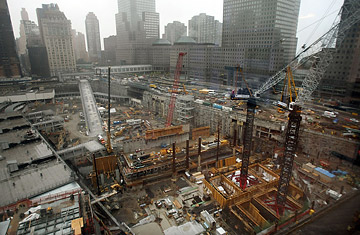
Ground Zero
Go to the website for the Lower Manhattan Development Corp., the government agency created after 9/11 to help redevelop Ground Zero and environs, and the first thing you'll see is a slogan that probably sounds a lot more defensive than intended: There Is a Plan for Lower Manhattan.
Somebody tell that to Chris Ward.
He is executive director of the Port Authority of New York and New Jersey, which, as Ground Zero's landlord, is just one of the 19 government bureaucracies with a say in rebuilding the World Trade Center. On Monday he gave New York governor David Paterson a progress report. The best thing to do, he said over 34 pages, is scrap the budget and timeline for the whole project.
He did, however, set a deadline ... for setting deadlines. By September, he said, the public should find out which year this thing will be finished. The only thing that's certain right now is that it will take longer and cost more than you think.
Oh, and that 9/11 memorial? It won't be ready anytime soon either. Not for this year's anniversary of the attacks. Not even for the 10th anniversary, in 2011.
At least Ward is being candid. Call it a new twist on the 9/11 Truth Movement. He and his boss, Governor Paterson, should be lauded for resisting false promises about the country's largest construction site. Their predecessors probably would have addressed the current crisis in confidence about the unfinished (and in many places unstarted) job site with yet another fake ribbon-cutting ceremony.
What's at stake? Rebuilding Ground Zero was going to be America's statement of defiance to those who attacked us, our Knute Rockne speech to the nation. Seven years later, the lack of progress isn't just keeping us from rising from the rubble in downtown Manhattan. It's showing why we're lagging in the next great challenge to American power.
I'm talking about global competitiveness. It shouldn't escape anyone's attention that in half the time it has taken us to get where we are today at Ground Zero, China has completed construction on the equivalent of a dozen World Trade Center sites in the furiously efficient run-up to the Olympics.
True, conscript labor and forced relocations are not the American way. But we shouldn't be happy to be lapped by a command economy. Thomas Friedman argued this week in the New York Times that this presidential campaign's signal issue is going to be the economy and our competitiveness. He's right, but he could have added that the World Trade Center is an ongoing — and far too neglected — referendum on those very issues.
So how are we doing thus far? Not great. The former Deutsche Bank building at 130 Liberty St., empty since the attacks, still hasn't been demolished. Just safeguarding it has cost the government more than $150 million, and it took the lives of two firefighters in a construction fire last year. The rest of the 16-acre site is a tangle of more than 100 contractors and subcontractors without any real central guidance. Twin Towers developer Larry Silverstein has, in the view of critics, spent too much time litigating and not enough time cooperating. The Environmental Protection Agency first dangerously downplayed health risks immediately after 9/11, and then, as if to compensate, transformed itself into an über-regulator, fighting efforts to streamline some of the most basic demolition processes.
Even 9/11 advocacy groups share some of the blame. They've ground the process to a halt a few times, most recently over whether the Survivor's Staircase should stand in perpetuity exactly where it did the day of the attacks. It's a noble thing, trying to honor the memory of the victims. But few people are honored by this impasse of competing agendas.
Nobody is arguing that the rebuilding effort, which will add as much new office space as exists in all of downtown Atlanta, is simple. But it should be a national project, a priority for government at the highest levels, something that voters actually hold politicians accountable for. John McCain and Barack Obama are feuding these days over what constitutes legitimate infrastructure spending and what is just pork-barrel spending. But it won't simply take money to fix Ground Zero. It will take leadership, lots of it. A full acknowledgment of the site's problems from the candidates would help.
Lower Manhattan risks becoming a metaphor for America's sluggish response to our economic challenges. The nation's levees are failing. So are its sewage systems, which the environmental group American Rivers estimates will need about $390 billion worth of upgrades in the next 20 years. A recent U.S. Chamber of Commerce report reveals a litany of other problems: an overloaded rail infrastructure that needs new tracks, signals systems, tunnels and bridges. Ports that need dredging, canal locks that need replacing. While China is spending nearly 9% of its GDP — a massive investment — on infrastructure, Americans lose $9 billion a year in productivity from flight delays alone.
The global economy will reward those countries that can build quickly and solidly, that have the concentration and focus to tackle big construction and small maintenance alike. Bits and bytes are important, but so is steel and mortar.
It's not too late. If construction can proceed apace, then Ground Zero can still be a showcase for American engineering, efficiency and ingenuity. Ward's candor is a good start.
